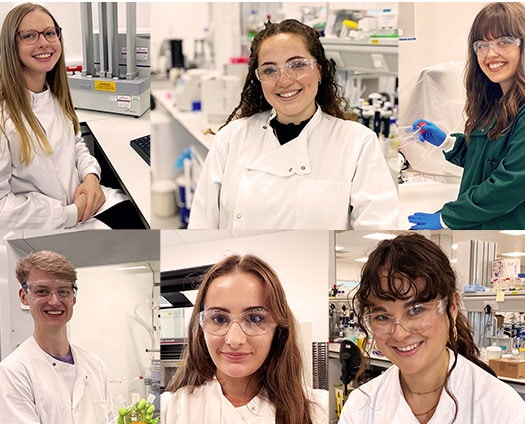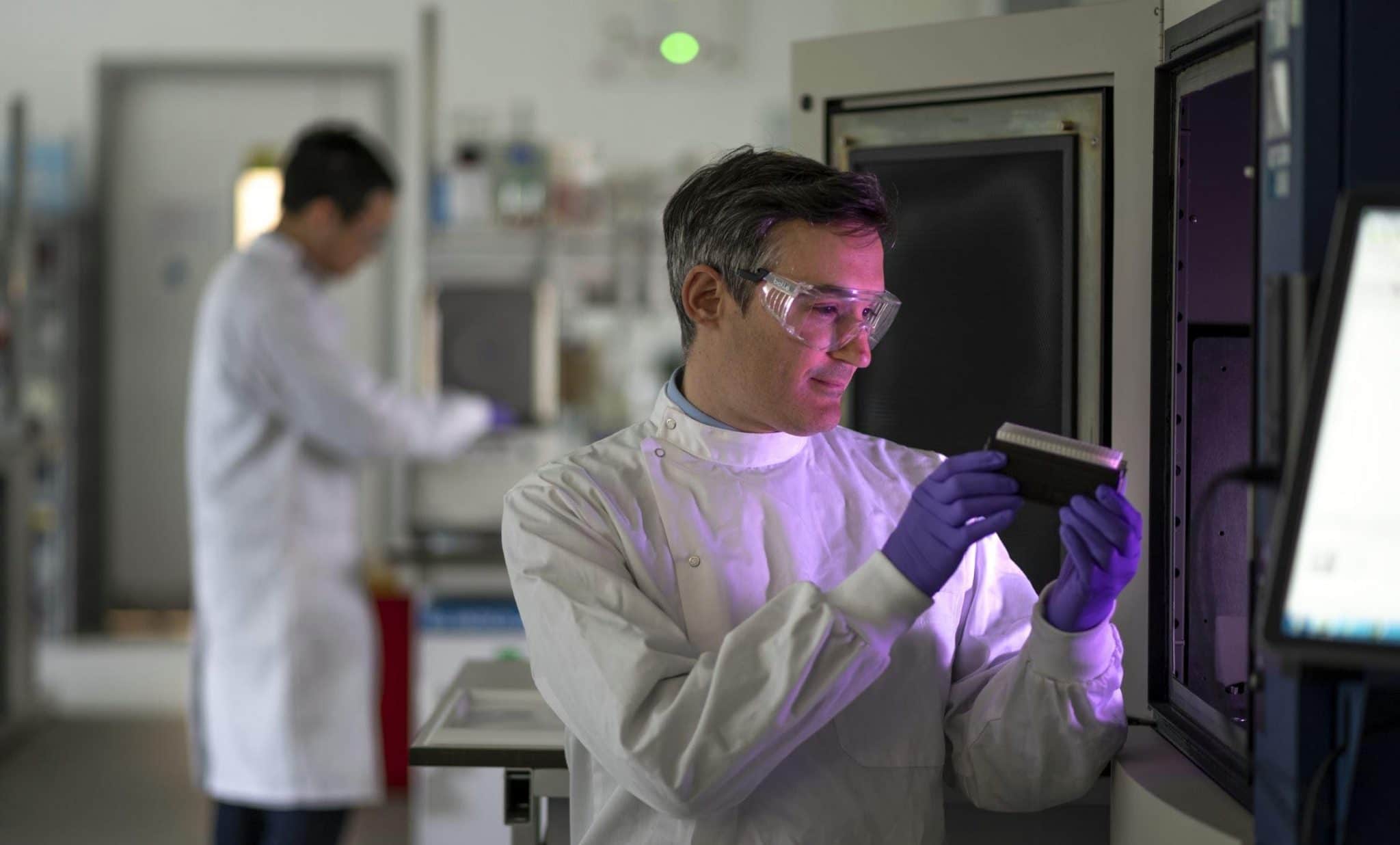As another turbulent year draws to a close, we’ve been looking back at a significant year for LifeArc. We’ve seen some exciting scientific progress, forged new partnerships and launched some new landmark initiatives.
We couldn’t have done all this alone. To all the people who’ve worked with us this year – thank you.
We can’t wait to see what we can achieve with our partners in 2023. First, watch our video and read below about some of our 2022 highlights.
January to March: The world’s largest COVID-19 study and a boost for rare disease research
Since 2020, LifeArc has invested £27 million into COVID-19 research, including £5 million to support GenOMICC – the world’s largest study exploring the genetics of people who become seriously ill with COVID-19. In March, the study published its results, which could shape future treatment. Dr Dave Powell, our Chief Scientific Officer said: “These studies are important because they… could highlight potential future treatment options for COVID-19, either through new drugs or existing drugs that could be repurposed.”
Rare diseases are a focus for LifeArc and 2022 further confirmed our commitment to drive changes for people with these conditions. In February, we announced that along with the patient-led organisation PSC Support, we would fund a trial looking at a new and unique treatment for people with a rare liver disease – primary sclerosing cholangitis (PSC). And just a month later in March, along with the Scottish Government, we jointly awarded £300,000 to researchers at The University of Edinburgh to help progress potentially life-changing research for people with rare and complex health conditions, including motor neurone disease, malignant pleural mesothelioma, and Duchenne muscular dystrophy.
April to June: The world’s first antibody for asthma and a focus on neurodegeneration
As spring nudged towards summer, our teams were busy. In May, RQ Biotechnology Ltd (RQ Bio), a company co-founded by LifeArc, signed a licensing agreement with AstraZeneca to develop, manufacture and commercialise RQ Bio’s monoclonal antibodies against COVID-19. Then in June, we announced that LifeArc scientists were instrumental in developing the world’s first monoclonal antibody for asthma, now poised to enter a first-in-human clinical trial in the US.
Another of our key focus areas is neurodegeneration. In June, we committed £30 million to the UK Dementia Research Institute (UK DRI) to help accelerate development of new diagnostic tests, treatments, and devices that will help identify and treat a range of neurodegenerative diseases. During the same month, LifeArc, the MND Association, the My Name’5 Doddie Foundation, MND Scotland, the Medical Research Council (MRC) and the National Institute for Health and Care Research (NIHR) jointly awarded £4.25 million to discover desperately needed meaningful MND treatments in years, not decades.
July to September: The power of partnership and our role in a globally hailed Alzheimer’s breakthrough
Collaboration and partnership are key to everything we do here at LifeArc. In August we announced another round of awards in partnership with Great Ormond Street Hospital Children’s Charity. We jointly awarded more than £1.3 million to progress new tests and treatments for rare diseases, including Maple Syrup Urine Disease (MSUD), inherited eye diseases, a rare genetic kidney syndrome and a severe type of epilepsy. The same month, a collaboration with scientists at Marburg University and the Max-Planck Institute for Heart and Lung Research in Germany, announced the generation of an antibody that could be an effective new treatment for osteoporosis and multiple sclerosis.
Also in September, we announced some news that could hold hope for people with atopic dermatitis – our portfolio company Ducentis BioTherapeutics was acquired by Arcutis Biotherapeutics. Philip Huxley, founder of Ducentis, said: “Arcutis has the resources, experience and commitment to accelerate clinical development of [our drug] to treat patients with atopic dermatitis, and, in future, other serious autoimmune diseases lacking effective treatment options.”
Later in September a global news story broke, heralding a tipping point for Alzheimer’s disease research. For the first time, a drug called lecanemab was shown to have promising results in slowing the dementia in a phase 3 clinical trial. We were delighted to have played a role in developing this drug.
And finally, in a hectic September, we announced we’d joined forces with Cystic Fibrosis Trust and Medicines Discovery Catapult. Our aim is to address persistent infections in people with cystic fibrosis, that occur when the microbes become resistant to treatments.
October to December: Medicines repurposing and fresh hope for people with chronic respiratory infections.
A key part our ethos is to offer advice and support to others. In October, together with the MRC, we launched a new online toolkit to provide useful guidance for charities, researchers and others embarking on a medicines repurposing journey. We hope the toolkit will help potentially life-changing medicines reach the people who need them.
October saw AbbVie acquire our portfolio company DJS Antibodies, and us launch our new £5 million Gene Therapy Innovation Fund for academic researchers working to advance new gene therapy technologies for people living with a genetic condition through our network of Gene Therapy Innovation Hubs.
In November, we announced our commitment to transforming respiratory health. First, we funded a study to understand if machine learning technology can transform how people living with chronic respiratory conditions manage their health.
A few days later, we launched our Chronic Respiratory Infection Translational Challenge – a £100m programme to catalyse the development of new diagnostics, treatments and technologies for people living with bronchiectasis and cystic fibrosis. We also launched a major funding call as part of the initiative, committing £10m to fund up to five collaborative projects that seek to repurpose existing therapies and compounds as new potential treatments for the conditions.
December came and we cemented our commitment to neurodegeneration by launching our Motor Neuron Disease Translational Challenge and our £1m Primer Fund to discover new tests to develop solutions to accelerate MND diagnosis. This came shortly before the Government announced outline plans how they will spend £50 million they committed to MND research in November 2021. We look forward to working with them to firm up the plans next year.
It’s been a great year of progress for LifeArc. Thank you again to everyone who has worked with us. Here’s to a successful 2023!
Find out more
Would you like to keep up to date with LifeArc news? Sign up here for our newsletter.
Media contact
Andrew Stewart
Director of Communications



